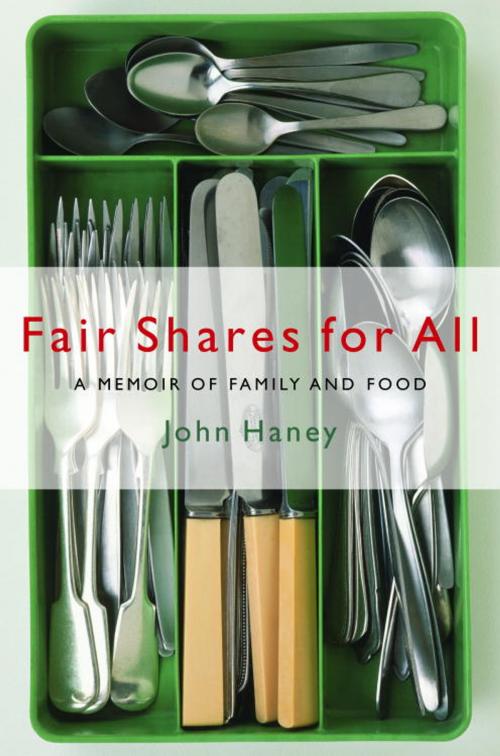Fair Shares for All
A Memoir of Family and Food
Nonfiction, Family & Relationships, Biography & Memoir| Author: | John Haney | ISBN: | 9781588368041 |
| Publisher: | Random House Publishing Group | Publication: | August 19, 2008 |
| Imprint: | Random House | Language: | English |
| Author: | John Haney |
| ISBN: | 9781588368041 |
| Publisher: | Random House Publishing Group |
| Publication: | August 19, 2008 |
| Imprint: | Random House |
| Language: | English |
In this beautifully written, vividly rendered memoir, John Haney, Gourmet magazine’s copy chief, describes his family’s day-to-day struggles, from the twilight of Queen Victoria’s reign to the dawn of the third millennium, in London’s least affluent working-class enclaves and suburbs, including a place called the Isle of Dogs–and reflects on how his family’s affection for the past and the food they loved brought them all together.
As a young John grows up in the fifties and sixties, the Haneys are a rough-and-tumble clan of bus drivers, telegraph operators, salesmen, junior civil servants, and secretaries. They work hard to put meals on the table and a shilling in the gas meter. When they gather at weddings and wakes and Christmas parties, they talk about politics and two world wars, drink cheap sherry, chain-smoke cigarettes, and eat platefuls of distinctly British fare: winkles, whelks, sausage rolls, marmalade sandwiches, and spotted dick.
Enchanted and, at the same time, slightly embarrassed by his Cockney pedigree, the young John Haney lives a life torn between his colorful East End relatives–with their penchant for bangers, bacon sandwiches, and highly irreverent banter–and his lower-middle-class mother, who is preoccupied with her children’s education. Thanks to the generosity of his more moneyed neighbors, John is able to take trips to France and Italy, where, despite his continuing passion for baked beans on toast and toad-in-the-hole, he cultivates a taste for snails, Sancerre, stinky cheese, and minestra di pasta grattata.
Having survived grammar school, university, four years of part-time horsing around in the RAF’s equivalent of the JROTC, and a stint of semi-starvation in the music business, John is poised to break out of the working class–and ends up in Manhattan, where he promptly falls in love and decides to stay put.
But crossing the Atlantic–and with it the class barrier–leaves John with deep feelings of displacement and nostalgia. As he eats in some of New York City’s most expensive restaurants, he tries (and fails) to reconcile his new appetites with the indelible tastes of his youth. His sense of self becomes further conflicted when his father, a taciturn but loving man, dies and later when his ferociously proud mother, following the death of her second husband, must subsist on a minuscule pension. Suddenly John is forced to reconsider his defection and to grapple with memories, fleeting but formidable, of the long-ago life that has continued to, and always will, define him.
Peopled with unforgettable characters who find in even the greasiest kitchens the sustenance to see them through life’s hardships, Fair Shares for All is a remarkable memoir of resolve and resilience, food and family.
In this beautifully written, vividly rendered memoir, John Haney, Gourmet magazine’s copy chief, describes his family’s day-to-day struggles, from the twilight of Queen Victoria’s reign to the dawn of the third millennium, in London’s least affluent working-class enclaves and suburbs, including a place called the Isle of Dogs–and reflects on how his family’s affection for the past and the food they loved brought them all together.
As a young John grows up in the fifties and sixties, the Haneys are a rough-and-tumble clan of bus drivers, telegraph operators, salesmen, junior civil servants, and secretaries. They work hard to put meals on the table and a shilling in the gas meter. When they gather at weddings and wakes and Christmas parties, they talk about politics and two world wars, drink cheap sherry, chain-smoke cigarettes, and eat platefuls of distinctly British fare: winkles, whelks, sausage rolls, marmalade sandwiches, and spotted dick.
Enchanted and, at the same time, slightly embarrassed by his Cockney pedigree, the young John Haney lives a life torn between his colorful East End relatives–with their penchant for bangers, bacon sandwiches, and highly irreverent banter–and his lower-middle-class mother, who is preoccupied with her children’s education. Thanks to the generosity of his more moneyed neighbors, John is able to take trips to France and Italy, where, despite his continuing passion for baked beans on toast and toad-in-the-hole, he cultivates a taste for snails, Sancerre, stinky cheese, and minestra di pasta grattata.
Having survived grammar school, university, four years of part-time horsing around in the RAF’s equivalent of the JROTC, and a stint of semi-starvation in the music business, John is poised to break out of the working class–and ends up in Manhattan, where he promptly falls in love and decides to stay put.
But crossing the Atlantic–and with it the class barrier–leaves John with deep feelings of displacement and nostalgia. As he eats in some of New York City’s most expensive restaurants, he tries (and fails) to reconcile his new appetites with the indelible tastes of his youth. His sense of self becomes further conflicted when his father, a taciturn but loving man, dies and later when his ferociously proud mother, following the death of her second husband, must subsist on a minuscule pension. Suddenly John is forced to reconsider his defection and to grapple with memories, fleeting but formidable, of the long-ago life that has continued to, and always will, define him.
Peopled with unforgettable characters who find in even the greasiest kitchens the sustenance to see them through life’s hardships, Fair Shares for All is a remarkable memoir of resolve and resilience, food and family.















